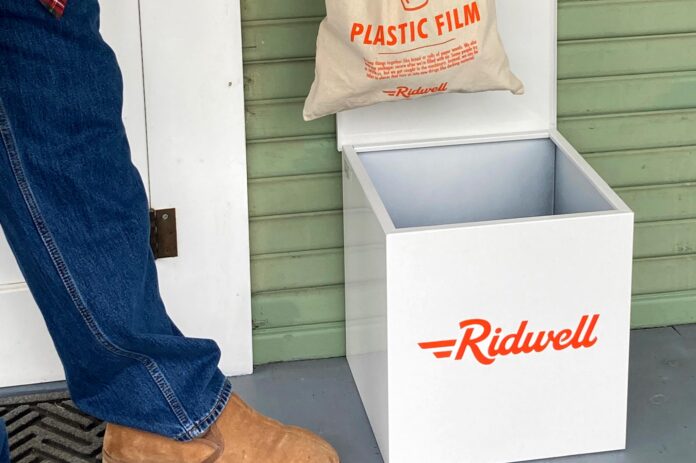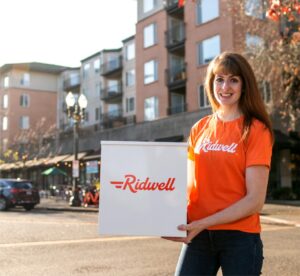
In Tigard, there’s a huge amount of interest in Ridwell, the Seattle company that collects reusables and hard-to-recycle items from residents in a metal box by the front door. More than 2000 households are on the company’s waiting list, but the city has yet to greenlight its operation locally.
“Tigard is interested in all options to increase the availability of recycling options like Ridwell currently provides, including working with current haulers to encourage them to expand their services,” said Tigard Mayor Jason Snider in a written statement.
“At this time, the Tigard Municipal Code doesn’t allow Ridwell to legally operate in the city, but we continue to work with other jurisdictions and our franchised haulers to seek agreement,” said Snider.
In an interview on Feb. 3, Caleb Weaver, public affairs manager for Ridwell, said “In Tigard, so far we’ve been unable to engage in productive discussions (with city officials) about how we could offer service to the many residents of Tigard who have expressed interest. We continue to hope that we’ll be able to do that soon.”
Weaver said that while Ridwell believes that it can operate under current codes, “We are happy to work with jurisdictions on any updates or other code changes if that is the way those jurisdictions wish to go.”
The company has approximately 20,000 customers in the Portland metropolitan area.
“Our service is really focused on the households,” said Weaver. “We meet the needs of residents that have materials that they want to reuse or recycle, but they can’t do that easily or conveniently. We are offering a different fundamental service than what the garbage haulers are doing. We do not see any conflict between the work that they’re doing and the service we’re providing.”
In a Jan. 6 City of Tigard staff report, Metro Councilor Garritt Rosenthal is quoted as saying that his goal is, “to see that the overall system functions efficiently and that these ‘hard to recycle’ wastes get diverted from landfills and that such services are available to all income levels. Currently, the matter is in the hands of the DEQ and I suspect Metro will not be in a position to make a decision before February or March of 2022.”
One of Tigard’s adopted City Council goals is to develop and implement a community resiliency plan that is specific to the needs of the Tigard community.
The city plan is to reduce its carbon footprint, implement resiliency practices that help to achieve carbon neutrality by the year 2035, and communicate resiliency efforts to the community to encourage individuals and businesses to adopt new practices that support the city’s climate goals.
Tigard is talking with the city’s franchised waste haulers to see if any have the capacity to provide a similar service.
According to the staff report, “There are unanswered questions regarding Ridwell’s costs to lower-income families and, of course, the ultimate destination of waste collected by Ridwell.”
Ridwell has a scholarship fund for low-income individuals and households.
“We have a bank of donations that members have provided to help folks, for whom cost is a barrier, to be able to use the service,” Weaver said.
Regarding waste disposal, Weaver said the company’s handling of recyclables is transparent. Destinations and percentages of waste contamination are posted and regularly updated on its website.
“We all benefit from removing hard-to-recycle items from the landfill, so our policies should ensure everyone can participate, regardless of income,” said Snider. “I understand that Metro is working on a summary of permit and licensing timelines to share with all interested parties.”
Cities in Washington County, including Tigard, would review their solid waste rules after that.
What’s Ridwell?
Want to recycle clear plastic clamshells, household batteries, fluorescent tubes, or Styrofoam? None of these items are currently collected by franchised garbage and recycling companies.
That’s where Ridwell comes in.
This is how it works. Ridwell supplies the customer with a white metal box to place at or near their front door, for the collection of select items. Five canvas bags – marked for light bulbs, household batteries, threads, plastic film, and a monthly featured item – are provided as well.
Reusables, accepted for the benefit of charities at a scheduled time, have included items like jeans, children’s books, electronics, holiday decorations, and winter coats.
Subscriptions are $12 to $16 per month, depending on the customer’s commitment. For example, one year prepaid is $12 per month. Additionally, plastic PET clamshells are $1 per bag, florescent tubes are $4 each, and polystyrene (Styrofoam) is $9 per bag.
Every two weeks an employee drives up in a van and collects the recyclables. Those recyclable and reusable items are then sorted, and distributed at the company’s Portland warehouse.

























